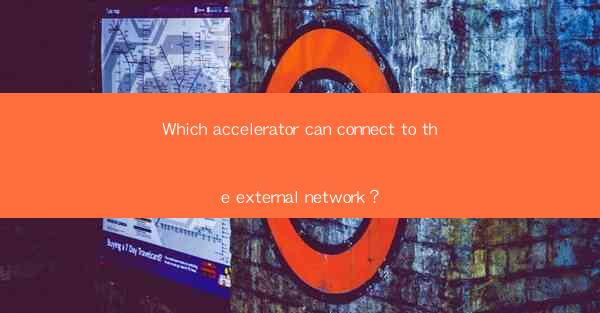
Introduction to Accelerators and External Network Connectivity
In the rapidly evolving landscape of technology, accelerators play a crucial role in enhancing the performance of various devices and systems. One of the key functionalities of these accelerators is their ability to connect to external networks. This article delves into the different types of accelerators and their capabilities in connecting to external networks, exploring various aspects such as their design, technology, applications, and future prospects.
Types of Accelerators for External Network Connectivity
1. Network Interface Cards (NICs): Network Interface Cards are hardware devices that enable computers to connect to a network. They come in various forms, such as Ethernet cards, Wi-Fi cards, and Bluetooth cards. These cards are designed to handle the data transmission between the computer and the external network efficiently.
2. Wireless Accelerators: With the increasing reliance on wireless technology, wireless accelerators have become essential. These accelerators enhance the wireless connectivity of devices, ensuring faster and more reliable network access.
3. Gigabit Ethernet Accelerators: Gigabit Ethernet accelerators are designed to provide high-speed network connectivity. They support data transfer rates of up to 1 Gbps, making them ideal for applications that require rapid data exchange.
4. InfiniBand Accelerators: InfiniBand is a high-speed interconnect technology that offers high bandwidth and low latency. InfiniBand accelerators are commonly used in data centers and high-performance computing environments.
5. USB Network Adapters: USB network adapters provide a convenient and flexible way to connect devices to external networks. They are widely used in laptops, desktops, and other portable devices.
6. PCI Express (PCIe) Network Cards: PCIe network cards offer high-speed data transfer rates and are compatible with a wide range of devices. They are commonly used in servers and workstations for network connectivity.
7. Software-defined Networking (SDN) Accelerators: SDN accelerators enhance the performance of SDN-based networks by offloading network functions from the CPU to dedicated hardware. This results in improved network efficiency and reduced latency.
8. Network Processing Units (NPUs): NPUs are specialized processors designed to handle network-related tasks. They are capable of performing complex network operations at high speeds, making them suitable for external network connectivity.
Design and Technology of Accelerators for External Network Connectivity
1. Hardware Design: The hardware design of accelerators for external network connectivity is crucial for ensuring efficient data transmission. It involves the selection of appropriate components, such as processors, memory, and interfaces, to meet the specific requirements of the network.
2. Data Processing Techniques: Accelerators use various data processing techniques to enhance network performance. These include caching, compression, and error correction algorithms, which help in optimizing data transmission.
3. Energy Efficiency: With the growing concern for energy consumption, accelerators are designed to be energy-efficient. This involves the use of low-power components and power management techniques to minimize energy usage.
4. Scalability: Accelerators should be scalable to accommodate the increasing demand for network bandwidth. This requires the ability to handle higher data rates and support more devices simultaneously.
5. Security: Security is a critical aspect of external network connectivity. Accelerators incorporate advanced security features, such as encryption and authentication, to protect data during transmission.
6. Interoperability: Accelerators should be interoperable with various network devices and protocols. This ensures seamless integration into existing network infrastructures.
Applications of Accelerators in External Network Connectivity
1. Data Centers: Accelerators are extensively used in data centers to enhance network performance and reduce latency. They enable faster data transfer between servers and storage systems.
2. Cloud Computing: In cloud computing environments, accelerators play a vital role in improving the connectivity between cloud servers and clients. This results in faster data access and better overall performance.
3. High-performance Computing (HPC): HPC applications require high-speed network connectivity to facilitate efficient data sharing between computing nodes. Accelerators are essential for achieving this goal.
4. Telecommunications: Accelerators are used in telecommunications networks to improve the performance of data transmission between different network nodes.
5. Internet of Things (IoT): With the growing number of IoT devices, accelerators are crucial for ensuring reliable and efficient network connectivity for these devices.
6. Smart Cities: Accelerators are used in smart city applications to enhance the connectivity between various smart devices and systems, enabling seamless data exchange and improved urban management.
7. Financial Services: In the financial sector, accelerators are used to ensure secure and high-speed data transmission between trading platforms and financial institutions.
8. Healthcare: Accelerators are used in healthcare applications to facilitate the transfer of medical data between hospitals, clinics, and research institutions.
Future Prospects and Challenges
1. 5G Connectivity: With the rollout of 5G technology, accelerators will need to adapt to the higher data rates and lower latency requirements of 5G networks.
2. Edge Computing: As edge computing becomes more prevalent, accelerators will play a crucial role in enabling efficient data processing and connectivity at the edge of the network.
3. Quantum Computing: The integration of accelerators with quantum computing technologies could revolutionize external network connectivity, offering unprecedented speeds and security.
4. Artificial Intelligence (AI): AI-driven accelerators could enhance network performance by optimizing data routing, traffic management, and security protocols.
5. Interoperability Issues: Ensuring interoperability between different types of accelerators and network devices remains a significant challenge.
6. Security Concerns: As networks become more complex, securing data during transmission will continue to be a major concern for accelerators.
7. Energy Consumption: Reducing energy consumption while maintaining high performance will be a key focus for future accelerator designs.
8. Regulatory Compliance: Adhering to regulatory standards and ensuring compliance with data protection laws will be essential for the widespread adoption of accelerators in external network connectivity.
In conclusion, accelerators play a vital role in connecting devices to external networks, enhancing network performance, and enabling a wide range of applications. As technology continues to evolve, the demand for efficient and secure accelerators will only grow, presenting both opportunities and challenges for the industry.










